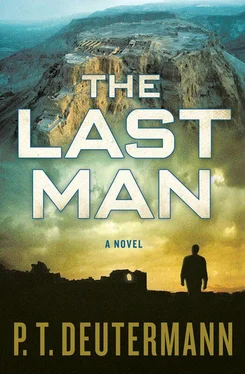“Sure.”
He patted her hand. “Give me your headlamp — I’ll need it to mark the entrance here. You can use the spare, although you should just shut it off until I get back. I want to look around the entrance to this cave to see if we’ve missed something. Then I’ll retrieve the bottles and get them into the cave.”
“And then?”
“And then we keep on trying things until something works. Give me a hand with this rig, please?”
She helped him into his tank harness. He checked his weights, tested the regulator, and pulled on his mask. She was clutching his forearm. “Don’t leave me here,” she whispered.
“Never,” he said. Then he got down on his hands and knees, flattened out, and crawled into the water like a crocodile. He bumped and banged his way through the flooded narrow passage until he came out into the main cistern. He was just able to turn around in the cave entrance. He checked his gear one more time and then took a compass bearing to get himself to where he remembered the main slab was. That’s where the bottles had been; where they were now, of course, was anyone’s guess, except they should still be bumping along the ceiling of the cistern. He was aware that he might have to search for them, expending more precious air in the process.
He positioned Judith’s headlamp at the cave entrance and turned it on. It was not as strong as it had been. Then he launched from the lip of the entrance and headed up toward the ceiling, searching for the slab hole and the air tanks. After five minutes he had found neither and felt the first strings of panic. Then he remembered the air bubble trick. He exhaled and watched, but the bubbles now just drifted along the ceiling. Of course, he thought, the damned slab is down. He checked his compass and headed due east. If he had to, he would crisscross the ceiling from east to west until he found either the tanks or the slab hole.
He finally fetched up against the eastern wall. Nothing. Just the smooth grayish rock of the ceiling and upper walls staring back at him. He reversed course and swam back, offsetting as best he could, heading west now. He ran up against the western wall without finding anything. He reversed again. In his mind he was executing a search pattern along the ceiling, trying to offset his track by three or four feet each time, but he knew full well that, without a visual reference, he might be plowing through the same water over and over again. Have to keep trying, he thought grimly. Not going to just sit in that cave and suffocate.
The third time he hit the eastern wall something caught his eye, but it wasn’t an air tank. It was another pipe, similar to the one down at the bottom. There was a mesh screen over this one, but otherwise no indication of what it was for. He paused, treading water, while he tried to figure it out. It felt like his air supply was beginning to resist his breathing, a sure sign that he was running out of air. He didn’t want to look at his gauges. Pipe at the bottom with a current coming in. He felt the screen, and his gloved hand adhered to it. Current going out. A recirculating system of some kind? Water pumped in from that plant and then taken back out up here at the top of the cistern? He put both hands up against the mesh screen; after a few seconds the suction effect was more pronounced. It gave him an idea.
He turned around and swam back over to the western wall. When he hit the rock on that side, he turned off his light and looked down. His reference light was visible as a dim glow almost directly beneath him. Finally did something right, he thought, as he dived down to the side cave entrance. A minute later he broke through the air-water interface in the cave. Judith was standing next to the wall with her headlight still on, studying the symbols. He took off his mask and told her he had good news and bad news. The bad news was that he hadn’t found the tanks. The good news was about the second pipe.
“I think I know how to get us out of here,” he said, “but it’s going to be complicated.”
“I’ve been reading the walls,” she said, as if she hadn’t heard him. “Whoever wrote this was the Last Man — the one selected to make sure everyone else had committed suicide. He is telling the story of that night. It is… terrible, terrible beyond words.”
“Wow,” he said, momentarily forgetting their situation. “What was his name?”
“Judah,” she said. “Judah Sicarius. Sicarius means Daggerman. I’m about halfway through it. It’s definitely first-century Aramaic.”
“I can’t believe you can just read that stuff. It all looks like hieroglyphics to me.”
“I can read it, all right, but it is not pleasant reading. How are we going to get out of this place, David Hall?”
“Physics,” he said. “I hope, anyway. There’s a second pipe — at the top of the main cave. It’s an outlet pipe. I think this cistern is a recirculation system. My plan is to block the outlet and hope like hell that the inlet pipe remains pressurized. There has to be a pretty big pump down at that plant to get water all the way up to the main cistern.”
“And this will work how?”
“Water does not compress,” he said. “So if that pump keeps pumping, the pressure in the cistern will rise until at some point the force on the bottom of that slab will be more than it weighs, and then it will pop up out of the hole — but just for an instant. I plan to be there, and, hopefully, I’ll be able to jam that steel pipe over there into the crack. If I can do that, we can breathe, and if we can breathe, we can maybe think of something to get us out of here. Just one problem.”
She walked back over to join him on the sand. “Just one? Wouldn’t that same pressure push the water all the way into this cave?”
He smiled. “Knew you were smart, but yes, it will. Only we’re going to use that slab up there on the altar to block the entrance. That means you’re going to have to stay in here when I do this.”
“I do not want to stay in here,” she began.
“We have no choice — I’m going to need your air tank, and you are probably going to have to stand on that slab to keep the water out of this cave. Stand on it and pile on any weight we can find to keep it in place. Like that big menorah up there, and those rocks.”
“But—”
“I know, it’s probably going to leak by — but it’s all we have, Judith. That slab is around ten square feet. That’s fourteen hundred and forty square inches. If I can get the pressure in the main cistern to rise just five pounds per square inch, that will exert almost four tons of force, and that slab doesn’t weigh four tons.”
She was silent, obviously frightened to death by the prospect of being trapped in this cave, with water rising and no breathing rig.
He gripped her shoulders. “Look: This ought to work. As long as the pump down there at the plant doesn’t have some kind of back-pressure shutoff switch, the surge in the cistern water pressure ought to dislodge that slab. If I can get a pipe into the crack and wedge it open then maybe we’ll have air.”
“Ought to. Maybe. Okay, and then what? What do we do — shout for help?”
“Damn right. Or try to wedge the slab completely out. Or do something else — who knows? Anyway, if we can breathe, we can keep trying to get out of this mess. It’s called survival, Judith.”
She turned away, her face in shadow. “Maybe you should just go do this thing, David Hall. I think maybe you want to survive more than I do.”
He’d forgotten about Dov, and the fact that she had been reading the testimonial of the last Jew on the mountain, describing the killing of women and children. Masada might be a mountain of death, he thought, but he was determined not to join the nine hundred and sixty souls who had died in this place. Correction, he thought: nine hundred and sixty-one.
Читать дальше












